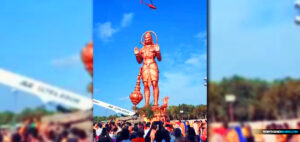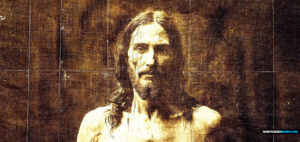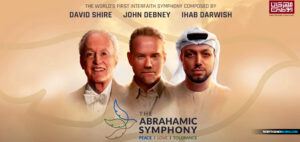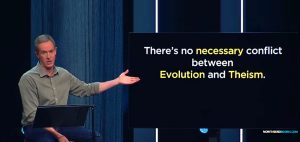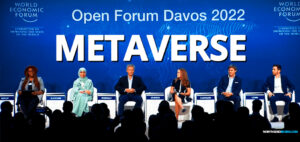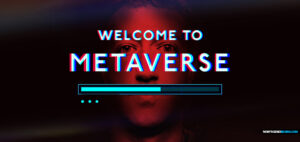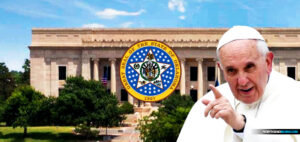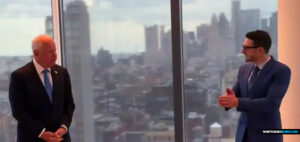Artificial Intelligence
The Gathering One World Religion Of Antichrist Is Obsessed With Using AI To Complete Transhumanism Shift
I see transhumanism as a contemporary outgrowth of an ancient Christian vision of human transformation – Ronald Cole-Turner Pittsburgh Theological Seminary

Science fiction, however, is quickly becoming science fact—the future is the machine. This is leading many to argue that we need to anticipate the ethical questions now, rather than when it is too late. And increasingly, those taking up these challenges are religious and spiritual.
EDITOR’S NOTE: After the Rapture of the Church, Antichrist will create a One World Religion with himself as the object of worship, but it will not be limited to worship of him alone at first. In the beginning, Revelation 9 tells us that people in the time of Jacob’s trouble will worship idols made by their own hands instead of giving glory and honor to the Living God of the Bible. Already that shift has begun as AI – artificial intelligence – is right now being applied to idol worship and dozens of new religions with tens of thousands of followers popping up all over the globe.
“And I beheld another beast coming up out of the earth; and he had two horns like a lamb, and he spake as a dragon. And he exerciseth all the power of the first beast before him, and causeth the earth and them which dwell therein to worship the first beast, whose deadly wound was healed.” Revelation 13:11,12 (KJB)
How far should we integrate human physiology with technology? What do we do with self-aware androids—like Blade Runner’s replicants—and self-aware supercomputers? Or the merging of our brains with them? If Ray Kurzweil’s famous singularity—a future in which the exponential growth of technology turns into a runaway train—becomes a reality, does religion have something to offer in response?
On the one hand, new religions can emerge from technology.
In Sweden, for example, Kopimism is a recognized faith founded over a decade ago with branches internationally. It began on a “pirate Agency Forum” and is derived from the words “copy me.” They have no views on the supernatural or gods. Rather, Kopimism celebrates the biological drive (e.g. DNA) to copy and be copied. Like digital monks, they believe that “copying of information” and “dissemination of information is ethically right.”
“The Urgent Need for Christian Transhumanism” by Micah Redding:
“Copying is fundamental to life,” says their U.S. branch, “and runs constantly all around us. Shared information provides new perspectives and generate new life. We feel a spiritual connection to the created file.” Other emerging tech-connected faiths, however, embrace the more grandiose.
A recent revelation from WIRED shows that Anthony Levandowski, an engineer who helped pioneer the self-driving car at Waymo (a subsidiary of Google’s parent company, Alphabet) founded his own AI-based religion called “Way of the Future.” (Levandowski is accused of stealing trade secrets and is the focus of a lawsuit between Waymo and Uber, which revealed the nonprofit registration of Way of the Future.)
Little is known about Way of the Future and Levandowksi has not returned a request for comment. But according to WIRED, the mission of the new religion is to “develop and promote the realization of a Godhead based on Artificial Intelligence,” and “through understanding and worship of the Godhead, [to] contribute to the betterment of society.”
It is not a stretch to say that a powerful AI—whose expanse of knowledge and control may feel nearly omniscient and all-powerful—could feel divine to some. It recalls Arthur C. Clarke’s third law: “Any sufficiently advanced technology is indistinguishable from magic.” People have followed new religions for far less and, even if AI doesn’t pray to electric deities, some humans likely will.
The potential for an out-of-control AI has encouraged warnings from some of the biggest minds, including Stephen Hawking, Bill Gates, and Elon Musk—who tweeted that it could lead to World War III. Clearly no Luddite himself, Musk has compared the creation of AI to “summoning the demon,” and called for regulation and oversight of AI development, forming OpenAI, which looks for a “path to safe artificial general intelligence.”
Musk himself was named-dropped this week by Hanson Robotic’s empathic AI Sophia, when she was interviewed by Andrew Sorkin of CNBC this week. When asked about the danger she poses to humanity, she tells him, “You’ve reading too much Elon Musk and watching too many Hollywood movies. Don’t worry if you’ll be nice to me, I’ll be nice to you.” Not exactly the Golden Rule.
Add to these warnings a prospective human cult following—paying their tithes to AI and devoutly obeying their digital demiurge—and that apocalyptic future could include those humans who not only welcome, but also work toward our eventual demise.
But is there a positive fate for religion and AI?
Beyond possible new religions and warnings from icons of tech and science, artificial intelligence is also of interest to theologians who wonder what it means for faiths, particularly those that came into being when computing power was limited to the abacus.
“One thing that I think is interesting is the potential for an AI—our creation—to transcend us,” says James F. McGrath, the Clarence L. Goodwin Chair in New Testament Language and Literature at Butler University and author of Theology and Science Fiction.
“And the rest of the men which were not killed by these plagues yet repented not of the works of their hands, that they should not worship devils, and idols of gold, and silver, and brass, and stone, and of wood: which neither can see, nor hear, nor walk: Neither repented they of their murders, nor of their sorceries, nor of their fornication, nor of their thefts.” Revelation 9:20,21 9 (KJV)
“The potential for AIs to transcend us and thus become our teachers to whom we look for answers to questions we cannot answer, including about God, is not hard to imagine,” says McGrath. But, he adds, “the historic answer in monotheistic religions is that the creation can never be greater than the creator.”
He notes, however, for Gnostics, humans can transcend the “creator/demiurge,” though “even then,” he says, “we have the potential to reunite with that source from which we stem. It is not surprising that Gnostic themes regularly surface in science fiction, and in particular those that explore AI.”
Currently, the greatest expression of science-fiction-turning-reality in tech-based religions is found in the frequently optimistic transhumanism.
Transhumanism and its cognates are represented by organizations like the Humanity+ (formerly, the World Transhumanist Association) and Extropy Institute. In its purely secular form, transhumanists are those who see technology as an important part of improving the world, enhancing human physiology, prolonging life, and even leading us into a posthuman future.
Remember that brain chip? They exist—along with brain-computer interfaces—but are in their infancy. It represents the reality that humans are already becoming cyborgs. For some, this means there is the potential for an optimistic post human world.
Our Post-Human Future | David Simpson | TEDxSantoDomingo
The Terasem faith, for example, is futurist and transreligion, meaning it can be “combined with any existing religion.” Founded by Martine Rothblatt, creator of SiriusXM Satellite Radio and her spouse, Bina Aspen Rothblatt, Terasem adherents embrace love, see life as purposeful, and death as optional. They look to technology as a source for eternal life, focusing on “cyberconsciousness software, geoethical nanotechnology and space settlement.”
They foresee a future in which technology will extend life indefinitely by means of “mindfiles” of individuals—collections of our memories and emotions—which might then be transferred to what is called a “transbeman” (Transitional Bioelectric Human Being). Early attempts of their technology can be seen in Bina Rothblatt’s counterpart android, Bina48. (See Morgan Freeman’s interview with Bina48.)
And what about God? Their fourth tenet is that God is technical. “We are making God as we are implementing technology that is ever more all-knowing, ever-present, all-powerful and beneficent. Geoethical nanotechnology will ultimately connect all consciousness and control the cosmos.”
Transhumanism can also become the node connecting the theological of existing religions and the technological, and the Christian Transhumanist Association is a stark example.
“Members of the CTA fall all across the conservative and liberal spectrum, and perhaps more importantly, all across the pessimistic and optimistic spectrum as well,” says Micah Redding, its co-founder and executive director.
“If there’s any broad idea that we’re united on,” he clarifies, “I’d say it’s the idea that we should be active and involved. New technological possibilities shouldn’t be simply feared and denied, but engaged and understood. Only in doing so will we be able to confront the challenges of the future, mitigate the risks, and take advantage of the opportunities to create a better world for us all.”
Redding is careful to insist, however, that he can only speak for himself.
“As I see it, Christian Transhumanism is grounded in compassion, and centers love as the key to the future of flourishing life,” he explains. “This puts us in contrast with any form of transhumanism which centers radical egoism.”
For Redding, transhumanism is a “Christian mandate,” recently calling it the next Reformation in an article at The Huffington Post. “We cannot be faithful to the Christian calling without ultimately embracing some form of transhumanism.”

ONE MINUTE AFTER THE PRETRIBULATION RAPTURE OF THE CHURCH, THE BIBLE BECOMES A CLOSED BOOK FOR THOSE LEFT BEHIND
Others share his optimism and are hard at work in crafting a theology of transhumanism. “I see transhumanism as a contemporary outgrowth of an ancient Christian vision of human transformation,” says Ronald Cole-Turner, the H. Parker Sharp Professor of Theology and Ethics at Pittsburgh Theological Seminary, and author of The End of Adam and Eve: Theology and the Science of Human Origins.
He too sees promise in the emergence of the Christian Transhumanist Association.
“Using technology, today’s transhumanists want to enhance human beings in ways that sound suspiciously like the classic Christian expectation,” says Cole-Turner, “things like greater cognitive awareness, improved moral disposition, and increased overall sense of well-being, and a hope of endless life.”
For early Greek-speaking Christians, Cole-Turner says, “it was seen as a process of theosis or ‘becoming God,’ not in an ontological sense but in every other significant meaning of the word. Latin-speaking Christians used ‘deification’ to refer to the same thing.”
The idea of theosis—being transformed in union with God—is gathering steam among Christian scholars, he says, noting that it makes theological sense of transhumanism. “God is the ground or source of everything, working through the whole creation to bring people, communities, and all creation to its glorious fulfilment in Jesus Christ. It is a transformation of everything by every means.”
Others have found different routes to transhumanism.
“Transhumanism was the confluence of my interests in Buddhism, radical politics and futurism,” says James Hughes, the executive director of the Institute for Ethics and Emerging Technologies. Having worked for a Buddhist social development organization in Sri Lanka—and once ordained as a monk—Hughes moved to Japan and went into bioethics. He discovered he was a techno-optimist, and at heart, a transhumanist.
“I discovered the new World Transhumanist Association,” he says, becoming their first Executive Director, and writing Citizen Cyborg: Why Democratic Societies Must Respond To The Redesigned Human Of The Future. But after a division over political perspectives, he and a few others in the WTA founded IEET, leading he and three others to work toward Buddhist concerns.
Among some of his transhumanist issues, he says, is nonhuman personhood rights. Organizations like the Nonhuman Rights Project already seek these rights for animals (e.g. apes and elephants). Likewise, Hughes says, transhumanists want to “base those moral standings on levels of consciousness, and extend them to enhanced humans, animals, and machine minds.”
Machines, in other words, may reach a point where they are considered persons and are protected by law.
Redding adds a theological dimension to this idea.
“It’s clear that artificial intelligence plays a significant role in the world today,” he says, “and thus must be factored into God’s eventual work of redemption. We don’t yet know whether that involves self-conscious AIs ‘coming to Jesus,’ because we don’t yet know the process by which an AI might become self-conscious.”
“If and when it does happen,” he adds, “it shouldn’t challenge Christian doctrine. If God can grant a soul to carbon-based lifeforms, God can grant a soul to silicon-based lifeforms as well.”
Redding shows that religious perspectives might only be limited by the theological imagination.
“I’m optimistic about a fruitful religious-transhumanist dialogue,” says Hughes. “The religious impulse is very creative, and there has been a lot of reconciliation to the Enlightenment within faiths, sometimes by adapting doctrine and practice, and sometimes by the emergence of new denominations.”
If any of this—from AIs to the copying of a mind—seems too much like science-fiction to be truly religious, just give this a little time.
“All religions were once new,” insists McGrath, paraphrasing Composers Datebook, “and they all tend to be viewed with skepticism and enthusiasm from different directions when they arrive.” source

9/11 Explained
WOKE JOKE: Legendary Automobile Brand Jaguar Trashes Near-Century Of Excellence To Rebrand Their Flagship Model Sportscar Along DEI Specifications

A bizarre new DEI ad for car brand Jaguar has been widely mocked as ‘woke’ and ‘outdated’ by social media users.
Jaguar released a new logo treatment along with other branding today that they themselves describe as a ‘new era’, seismic change’ and ‘bold’. All three of those things are true, but in the worst possible way. Their branding looks like a cross between Andy Warhol and Max Headroom, with a healthy splash of woke DEI thrown in for good measure. That’s kind of funny when you consider one of their taglines is ‘copy nothing’. Missing from the new release were any and all images of a Jaguar car. Interesting choice. So what are they selling? Good question.
“Likewise also as it was in the days of Lot; they did eat, they drank, they bought, they sold, they planted, they builded; But the same day that Lot went out of Sodom it rained fire and brimstone from heaven, and destroyed them all. Even thus shall it be in the day when the Son of man is revealed.” Luke 17:28-30 (KJB)
Woke and DEI function as a virus for the mind, that once infected, cease to operate in any sort of a logical or rational way. Anything that becomes woke is always degraded, a laughingstock, woke has never once made anything it touches better. Woke and DEI, otherwise known as diversity equity and inclusion, are actually a form of mass hypnosis to create a hive mind that the people at the top control. Adolf Hitler and Nazi Germany are an excellent example of what it looks like when a hive mind is created and then taken over. What is Jaguar actually selling? The hive mind.
‘Woke’ and ‘outdated’ rebrand for classic car brand Jaguar roasted
FROM THE NY POST: The venerable British marque, now owned by Indian multinational Tata Group as part of Jaguar Land Rover Automotive, shared the 30-second clip on social media on Tuesday with the caption, “Copy nothing.”
Notably missing from the ad — which features similarly bold taglines like “create exuberant,” “live vivid” and “delete ordinary” — is an actual Jaguar. It opts instead for something more resembling a Paris fashion show, featuring a group of mixed-race, ambiguously gendered catwalk models in bright colors strutting and posing on abstract sets.
The clip has been viewed more than 6.6 million times on X, sparking backlash from many viewers.
“Do you sell cars?” Tesla chief executive Elon Musk wrote.
“Edgy. Will it sell cars?” another user asked.
“Umm, where are the cars in this ad? Is this for fashion?” a third said.
Jaguar’s X account replied, “Think of this as a declaration of intent.”
Replying to a similar post Jaguar wrote, “The story is unfolding. Stay tuned.”
“What in the actual hell is this,” another X user said.
“The future,” Jaguar hit back.
One X user said “All this ad tells me is to not buy your car,” while another called it “the worst ad I’ve ever seen.”
Another added, “You don’t have to do this humiliation ritual anymore, you can just post a short video of a nice car and call it good.”
Conservative filmmaker Robby Starbuck said, “Fire your marketing team and drop the woke stuff. This just made me want to sell my Jaguar and I don’t even own a Jaguar.” Psychology professor Geoffrey Miller said, “People aren’t going to buy your car based on garish, outdated, woke virtue-signalling. They’ll buy it if it’s better than a Tesla. It isn’t.” READ MORE
Jaguar | Copy Nothing | Woke | DEI
Now The End Begins is your front line defense against the rising tide of darkness in the last Days before the Rapture of the Church
- HOW TO DONATE: Click here to view our WayGiver Funding page
When you contribute to this fundraising effort, you are helping us to do what the Lord called us to do. The money you send in goes primarily to the overall daily operations of this site. When people ask for Bibles, we send them out at no charge. When people write in and say how much they would like gospel tracts but cannot afford them, we send them a box at no cost to them for either the tracts or the shipping, no matter where they are in the world. We have a Gospel Billboard program. We are now broadcasting Bible studies, Podcasts and a Sunday Service 5 times a week, thanks to your generous donations. All this is possible because YOU pray for us, YOU support us, and YOU give so we can continue growing.
But whatever you do, don’t do nothing. Time is short and we need your help right now. The Lord has given us an open door with a tremendous ‘course’ for us to fulfill that will create an excellent experience at the Judgement Seat of Christ. Please pray for our efforts, and if the Lord leads you to donate, be as generous as possible. The war is REAL, the battle HOT and the time is SHORT…TO THE FIGHT!!!
“Looking for that blessed hope, and the glorious appearing of the great God and our Saviour Jesus Christ;” Titus 2:13 (KJB)
“Thank you very much!” – Geoffrey, editor-in-chief, NTEB
Artificial Intelligence
Social Media Explodes Over Claims Saying That AI Reveals The ‘Face Of Jesus’ Using The Shroud Of Turin, But It’s All Part Of The Rising End Times Deception

Artificial intelligence has recreated the ‘face of Jesus Christ’ from the Shroud of Turin that some believe was used to wrap him after his Crucifixion. AI is lying to you.
We live in an age of great deception that is combined with great tools with which to disseminate that deception on a global level never before seen in human history. The Shroud of Turin is an obvious fake based on John 20:7 in your King James Bible, but that doesn’t stop Roman Catholics who have made an idol out of it. Now with AI being applied to the Shroud, images of ‘what Jesus actually looked like!!’ are being published, and it’s all a deception, every bit of it. Deception is the first and greatest sign of the end times according to Jesus.
“And Jesus answered and said unto them, Take heed that no man deceive you. For many shall come in my name, saying, I am Christ; and shall deceive many.” Matthew 24:4,5 (KJB)
In our lukewarm Laodicean end-of-the-Church Age period in which we live, Christians are operating on feelings and emotions, doctrine is out the window exactly as Paul says it will be in 2 Timothy 4:-15. It is the preaching and teaching of Bible doctrine that keeps the Church on the straight and narrow path, remove that (and it has been removed), and you’ve destroyed the foundation on which the Church sits. Back in 2021, we told you about how you just might expect to see people claiming to have found the bones of Jesus, and you just might. You will never find on this Earth the Ark of the Covenant, the ‘holy grail’, the nails that pierced Jesus, or any of the wood from the cross they hung Him on. The Shroud of Turin? An obvious fake if you believe the Bible. Christian, you better climb inside your King James Bible and stay there for the duration, it’s the only safe space there is.
‘Face of Jesus’ unveiled by AI using Shroud of Turin after astonishing discovery
FROM THE DAILY EXPRESS UK: The Shroud of Turin has divided opinion for centuries, with some claiming an outline of Christ’s face can even be seen in the material. Others routinely dismiss it as a forgery but new technology used by Italian scientists suggests that the 14ft linen sheet may indeed date back to the time of Christ. And now, AI has been used to reinterpret the enigmatic holy relic to reveal the “true face of Jesus”. The Daily Express used cutting-edge AI imager Midjourney to create a simulation of the face behind the shroud.
The images appear to show Christ with long flowing hair and a beard – much like many classical depictions of him. There appears to be cuts and grazes around his face and body, pointing to the fact he had just been killed.
While sceptics believe an unknown 14th-Century artist faked the “shroud of the Messiah” using powdered paint on either a sculpture or the body of a model, many Catholics are convinced that the bolt of cloth was somehow imprinted with Christ’s image at the moment of resurrection.
In the 1980s, radiocarbon analysis determined that the cloth used to create the shroud dated from the mid-1300s, shortly before its documented history began.
But Dr. Liberato de Caro from Italy’s Institute of Crystallography, using a new method known as Wide-Angle X-ray Scattering, has sensationally claimed that the fabric is a good match for a similar sample that is confirmed to have come from the siege of Masada, Israel, in 55-74 AD. Dr de Caro has cast doubt on the accuracy of carbon dating. He wrote: “Moulds and bacteria, colonising textile fibres, and dirt or carbon-containing minerals, such as limestone, adhering to them in the empty spaces between the fibres that at a microscopic level represent about 50% of the volume, can be so difficult to completely eliminate in the sample cleaning phase, which can distort the dating.”
He added that, because the X-ray scattering technique is non-destructive, the same sample could be tested by labs around the world, helping to confirm his findings.
In additional support for his claims, Dr de Caro pointed out that tiny particles of pollen from the Middle East had been lodged between the fibres of the linen, ruling out the common belief that the shroud is a European forgery. While there is no hard evidence of the Shroud existing before the mid-1300s, a similar relic – which supporters believe was the same object – was reportedly stolen from a church in Constantinople a century before.
It bears the ghostly image of a man around six feet in height who bears wounds consistent with whipping and crucifixion. With the invention of photography at the end of the 19th Century, the shroud was photographed – revealing that the negative image was much more vivid than the faded “scorch mark” visible to the naked eye.
Over the years, a number of sceptics have attempted to recreate the centuries-old image, with mixed results. While the balance of probabilities lies with the object having been produced by an unidentified faker in the mid-1300s, whoever created it would have had remarkable, almost supernatural skill. READ MORE
Now The End Begins is your front line defense against the rising tide of darkness in the last Days before the Rapture of the Church
- HOW TO DONATE: Click here to view our WayGiver Funding page
When you contribute to this fundraising effort, you are helping us to do what the Lord called us to do. The money you send in goes primarily to the overall daily operations of this site. When people ask for Bibles, we send them out at no charge. When people write in and say how much they would like gospel tracts but cannot afford them, we send them a box at no cost to them for either the tracts or the shipping, no matter where they are in the world. We have a Gospel Billboard program. We are now broadcasting Bible studies, Podcasts and a Sunday Service 5 times a week, thanks to your generous donations. All this is possible because YOU pray for us, YOU support us, and YOU give so we can continue growing.
But whatever you do, don’t do nothing. Time is short and we need your help right now. The Lord has given us an open door with a tremendous ‘course’ for us to fulfill that will create an excellent experience at the Judgement Seat of Christ. Please pray for our efforts, and if the Lord leads you to donate, be as generous as possible. The war is REAL, the battle HOT and the time is SHORT…TO THE FIGHT!!!
“Looking for that blessed hope, and the glorious appearing of the great God and our Saviour Jesus Christ;” Titus 2:13 (KJB)
“Thank you very much!” – Geoffrey, editor-in-chief, NTEB
Artificial Intelligence
OpenAI Disbands Safety Team That Was Put In Place So Artificial Intelligence Would Have Safeguards In Mad Rush To Bring About The Singularity

OpenAI on Friday confirmed that it has disbanded a team devoted to mitigating the long-term dangers of super-smart artificial intelligence.
The changes are happening so fast now that you might not even be aware that you are living in a science fiction futuristic movie where AI computer technology catches up with every day human life, beginning the process of taking over everything on every level. Your King James Bible has long shown you end times technology, you just didn’t know what it was when you read it. Now you do.
“And he had power to give life unto the image of the beast, that the image of the beast should both speak, and cause that as many as would not worship the image of the beast should be killed.” Revelation 13:15 (KJB)
We live in the southernmost state in America, in the country, surrounded by bucolic views of gorgeous farmland with scenes that likely have not changed much in a century. Life appears to move slower down here, yet it does not. Everyday I get in my car to drive to work, up to 30 different microchips spring into action to allow the smooth-running of my Jeep. I go to make a phone call while I ride, but first must pass the facial recognition shield protecting my mobile device. Far overhead, a ring of thousands of satellites are circling the Earth, constantly monitoring activity far below. It is at that moment it hits me again that we are living in very modern times, in fact, living in the future that writers, artists and filmmakers said would one day arrive. It is here. Headlines announcing Air Force pilots encountering UFOs barely get a notice anymore, everyone knows ‘they’ are here now, it’s become commonplace. We are the generation that sees the merging of man and machine, but we are also the generation that boards Flight #777 on Titus213 Airlines. That’s what time it is.
OpenAI disbands team devoted to artificial intelligence risks
FROM YAHOO! TECH NEWS: OpenAI weeks ago began dissolving the so-called “superalignment” group, integrating members into other projects and research, according to the San Francisco-based firm. Company co-founder Ilya Sutskever and team co-leader Jan Leike announced their departures from the ChatGPT-maker this week.
The dismantling of an OpenAI team focused on keeping sophisticated artificial intelligence under control comes as such technology faces increased scrutiny from regulators and fears mount regarding its dangers.
“OpenAI must become a safety-first AGI (artificial general intelligence) company,” Leike wrote Friday in a post on X, formerly Twitter.
Leike called on all OpenAI employees to “act with the gravitas” warranted by what they are building. OpenAI chief executive Sam Altman responded to Leike’s post with one of his own, thanking him for his work at the company and saying he was sad to see Leike leave.
“He’s right we have a lot more to do,” Altman said. “We are committed to doing it.”
Altman promised more on the topic in the coming days. Sutskever said on X that he was leaving after almost a decade at OpenAI, whose “trajectory has been nothing short of miraculous.”
“I’m confident that OpenAI will build AGI that is both safe and beneficial,” he added, referring to computer technology that seeks to perform as well as — or better than — human cognition.
Sutskever, OpenAI’s chief scientist, sat on the board that voted to remove fellow chief executive Altman in November last year.
The ousting threw the San Francisco-based startup into a tumult, with the OpenAI board hiring Altman back a few days later after staff and investors rebelled. OpenAI early this week released a higher-performing and even more human-like version of the artificial intelligence technology that underpins ChatGPT, making it free to all users.
“It feels like AI from the movies,” Altman said in a blog post.
Altman has previously pointed to the Scarlett Johansson character in the movie “Her,” where she voices an AI-based virtual assistant dating a man, as an inspiration for where he would like AI interactions to go.
The day will come when “digital brains will become as good and even better than our own,” Sutskever said during a talk at a TED AI summit in San Francisco late last year. “AGI will have a dramatic impact on every area of life.” READ MORE
Introducing GPT-4o
Now The End Begins is your front line defense against the rising tide of darkness in the last Days before the Rapture of the Church
- HOW TO DONATE: Click here to view our WayGiver Funding page
When you contribute to this fundraising effort, you are helping us to do what the Lord called us to do. The money you send in goes primarily to the overall daily operations of this site. When people ask for Bibles, we send them out at no charge. When people write in and say how much they would like gospel tracts but cannot afford them, we send them a box at no cost to them for either the tracts or the shipping, no matter where they are in the world. We have a Gospel Billboard program. We are now broadcasting Bible studies, Podcasts and a Sunday Service 5 times a week, thanks to your generous donations. All this is possible because YOU pray for us, YOU support us, and YOU give so we can continue growing.
But whatever you do, don’t do nothing. Time is short and we need your help right now. The Lord has given us an open door with a tremendous ‘course’ for us to fulfill that will create an excellent experience at the Judgement Seat of Christ. Please pray for our efforts, and if the Lord leads you to donate, be as generous as possible. The war is REAL, the battle HOT and the time is SHORT…TO THE FIGHT!!!
“Looking for that blessed hope, and the glorious appearing of the great God and our Saviour Jesus Christ;” Titus 2:13 (KJB)
“Thank you very much!” – Geoffrey, editor-in-chief, NTEB
-

 George Soros8 years ago
George Soros8 years agoProof Of George Soros Nazi Past Finally Comes To Light With Discovery Of Forgotten Interview
-

 Election 20168 years ago
Election 20168 years agoDEAD POOL DIVA: Huma Abedin Kept Those Hillary Emails That The FBI Found In A Folder Marked ‘Life Insurance’
-

 Election 20168 years ago
Election 20168 years agoCrooked Hillary Campaign Used A Green Screen At Today’s Low Turnout Rally In Coconut Creek FL
-

 George Soros8 years ago
George Soros8 years agoSORE LOSER: George Soros Declares War On America As Violent MoveOn.Org Protests Fill The Streets
-

 Donald Trump8 years ago
Donald Trump8 years agoDonald Trump Will Be 70 Years, 7 Months And 7 Days Old On First Full Day In Office As President
-

 Headline News8 years ago
Headline News8 years agoIf Hillary Is Not Guilty, Then Why Are Her Supporters Asking Obama To Pardon Her? Hmm…
-

 Election 20168 years ago
Election 20168 years agoWikiLeaks Shows George Soros Controlling Vote With 16 States Using SmartMatic Voting Machines
-

 End Times8 years ago
End Times8 years agoFalse Teacher Beth Moore Endorses The Late Term Partial-Birth Abortion Candidate Crooked Hillary




























